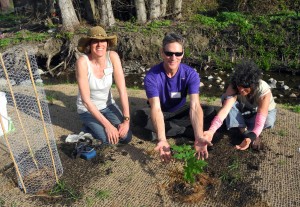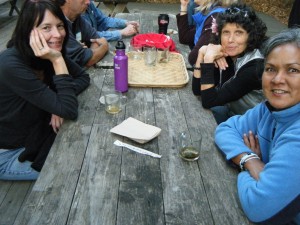Teri Gerritz, Green Sangha member and group leader, has been hosting meetings and retreats at her home in Berkeley since 2010. An avid hiker, bicyclist, and world traveler, she has worked on political campaigns, habitat restoration, and plastics awareness. She spoke with board member Jonathan Billig on Wednesday, August 12, 2015.
JB: How did you discover Green Sangha and why were you drawn to it initially?
Teri: I heard about Green Sangha from a friend who lives in Marin. Compassionate action is what really drew me to Green Sangha. My mother was an activist, but she was always in tears about the state of the world, and I didn’t want to be upset all the time as she was. I wanted to find a way to become involved that wouldn’t take such a heavy toll on me.
JB: What are some of the things that you learned through your Green Sangha experiences?
Teri: Finding common ground with other people instead of focusing and playing up on the differences is very helpful, and Green Sangha has helped me with that. I have a good friend whose politics are very different from mine, and her husband has VERY different politics, yet I can find common ground with him. Before my time with Green Sangha, I’m not sure I could have done that.
One of the things that I learned was that you never make anyone else into the enemy. It’s a matter of education, and we question ourselves and know that we might have something to learn, too. You can be a lot more effective if you hear where other people are coming from, and you might find a better entry point.
JB: What is your current involvement with Green Sangha?
Teri: The East Bay chapter meets at my house every month, even sometimes when I’m gone. I also work a lot of the events. Every meeting I provide the coffee and tea in my house and set up and clean up afterward. I also pay membership once a year.
JB: Are there any specific techniques that you have found useful?
Teri: Green Sangha gave me the meditation and the activism components of Buddhist practice. I did do a silent meditation retreat about ten years ago, but I had some trouble applying what I learned to everyday life because I wanted a more active process. Because of Green Sangha I have been involved with a regular meditation group, so the connections have been very helpful. I like Margaret Mead’s idea, that change can be significant even if it seems small, and it has to start with you, not with other people.
JB: How is your experience with Green Sangha connected to the work you currently do?
Teri: Well, for one thing I really like the Green Sangha principles. They’re on the wall in my office!
I work with an organization for retired teachers, and I’ve introduced some Green Sangha practices at the retired teachers meetings. I’ve found that the board meeting is more productive, calmer, and people listen to each other more after we do a simple body scan. At our most recent meeting, I led part of Jack Kornfield’s forgiveness meditation. I also share mindfulness with some of my students, many of whom suffer from anxiety. It helps them a lot.
JB: Do you have any advice for mindful activists or social-change oriented educators like yourself?
Teri: It’s easy to feel like we’re not doing enough, and I try to remind myself that I’m doing what I can and that other people are doing what they can. Mainly it’s Principle 5 from Green Sangha’s list: we meet injustice without becoming lost in it. That sums it up. I just think it’s a fun journey.
Also, I find that when you sit with other people it’s more powerful than sitting alone. Even if they’ve never meditated before, there’s something about the group energy. Something about being in that room together, and community – it’s very powerful.



